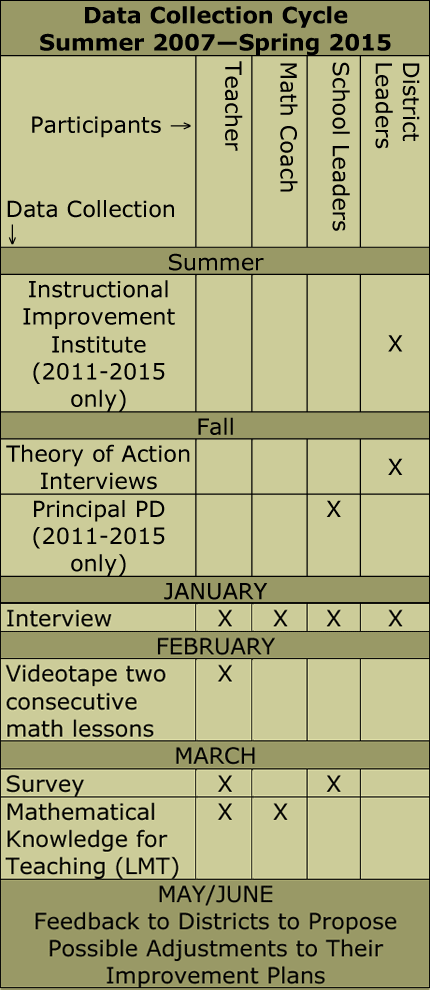District Theories of Action
In the Summer and Fall of each annual cycle, we interview district leaders to document the four participating districts' theories of action for improving the quality of middle grades mathematics teaching and learning. A theory of action comprises (1) a district's goals for high-quality mathematics instruction, (2) the policies that constitute its design for supporting instructional improvement, and (3) the underlying conjectures about both a trajectory for school and district improvement and the specific means of supporting the envisioned improvement processes.
Phase 1: Rounds 1 through 4 Data Collection
The first four rounds of data collection were conducted January-March of 2008, 2009, 2010 and 2011. The data collected in each round comprise, for each year and with all of the 120 participating teachers from the four collaborating districts:
· Audio-recorded interviews and on-line surveys
· Learning Mathematics for Teaching (LMT) scores
· Video-recordings of two consecutive mathematics lessons, which were later analyzed and assigned scores using the Instructional Quality Assessment (IQA) rubrics
At the level of school and district administration, the data we collected included:
· Approximately 80 audio-recorded interviews of school and district instructional leaders
· 30 on-line surveys of the principals of the participating teachers' schools
In Rounds 2, 3, and 4 additional data included:
· Audio-recordings of school-based collaboration and planning meetings of mathematics teachers in each district.
· Short on-line surveys of all 300 mathematics teachers in the participating teachers' schools to document teacher networks.
Phase 2: Rounds 5 through 8 Data Collection
The next four rounds of data collection are being conducted in January-March of 2012, 2013, 2014 and 2015. During Phase 2, we will continue to collect the data described above from 120 teachers and approximately 80 school and district instructional leaders in the two collaborating districts. In addition, in Phase 2 we will also collect the following data:
· Video-recordings of the Summer Instructional Improvement institute conducted with leaders of the two collaborating districts
· Video-recordings of two professional development sessions for principals, coaches and teachers in each district in the fall of each year
· Video-recordings of two consecutive school-based collaborative planning meetings in four schools in each district twice a year (four sessions per school per year).
Data Analysis and Feedback to District Leaders
Sample feedback reports can be downloaded from the Dissemination page.
February-May of each year, we analyze transcripts of the 200 audio-recorded interviews conducted in January to document how each district’s theory of action is playing out in schools and classrooms, and to identify and explain gaps between the district’s intended theory of action. On this basis, we develop a detailed report for leaders in each district in which we summarize our findings and made actionable recommendations on how they might adjust their improvement policies to make them more effective. Each May, we visit the districts to discuss our findings and recommendations with district leaders in a two-hour meeting.
The interviews we conduct the following October to document each district’s theories of action allow us to assess the extent to which they have acted on our recommendations. The revisions that districts have made to their improvement policies indicates that this approach has been relatively effective and that we have, in effect, become co-designers with district leaders.

